An Analysis of Neo-liberalism's Impact on Australian Schooling
VerifiedAdded on 2020/12/24
|10
|2889
|376
Essay
AI Summary
This essay provides a comprehensive analysis of the impact of neo-liberalism on the Australian schooling system. It begins by defining neo-liberalism and its philosophical underpinnings, then examines the implementation of neo-liberal policies and programs within the education sector. The essay highlights the effects of these policies, including the marketization of education, increased competition between schools, and a shift in focus from student learning to business agendas. It explores the critical awareness of these effects, such as the erosion of public schools and the commodification of education, while also offering future recommendations for balancing traditional teaching methodologies with neo-liberal influences to maintain a quality education. The essay emphasizes the need for government support for research and academic freedom, and the importance of addressing the negative impacts on students and the overall educational landscape. The essay concludes by underscoring the need for a balanced approach to education, integrating the benefits of both traditional and neo-liberal methodologies to promote a well-rounded learning environment.
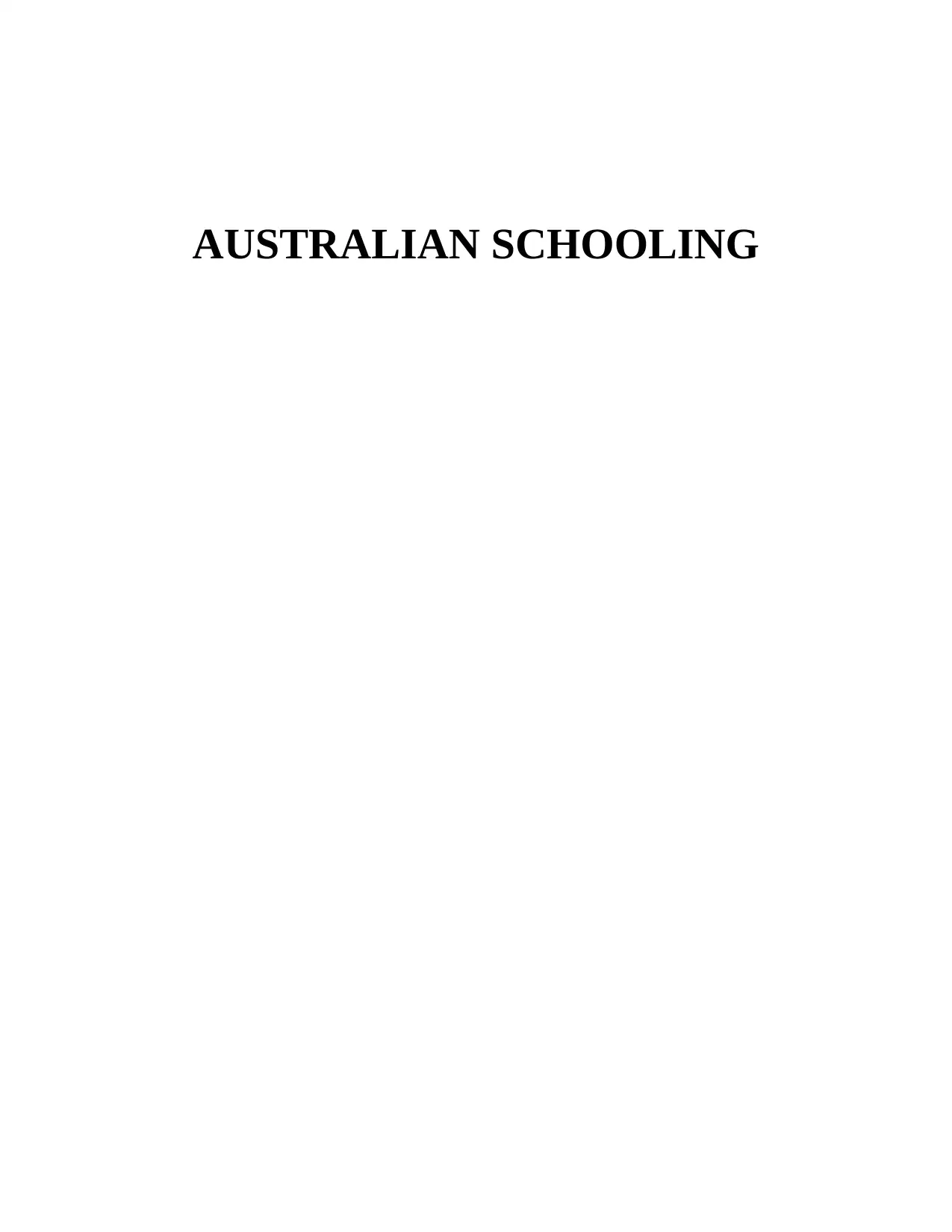
AUSTRALIAN SCHOOLING
Paraphrase This Document
Need a fresh take? Get an instant paraphrase of this document with our AI Paraphraser
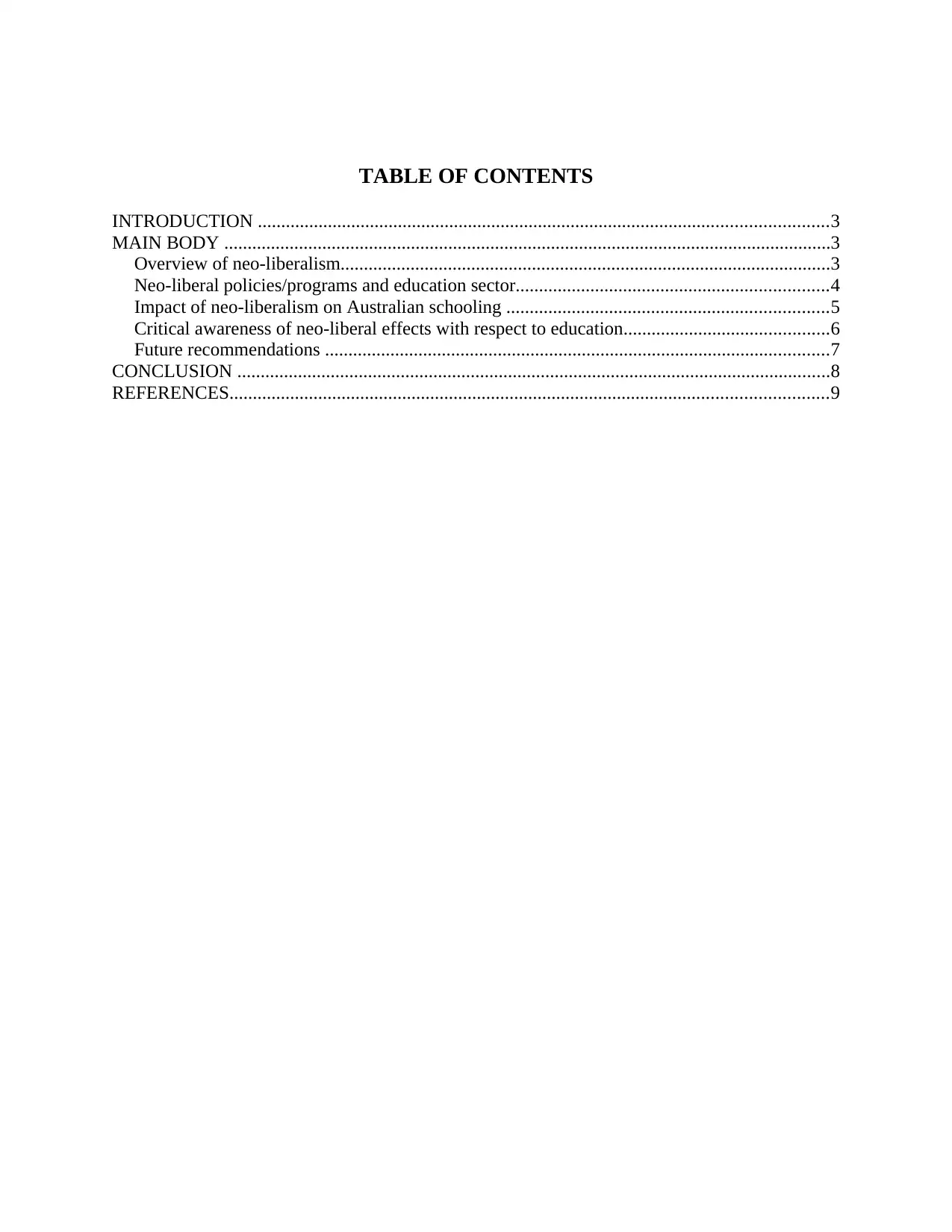
TABLE OF CONTENTS
INTRODUCTION ..........................................................................................................................3
MAIN BODY ..................................................................................................................................3
Overview of neo-liberalism.........................................................................................................3
Neo-liberal policies/programs and education sector...................................................................4
Impact of neo-liberalism on Australian schooling .....................................................................5
Critical awareness of neo-liberal effects with respect to education............................................6
Future recommendations ............................................................................................................7
CONCLUSION ...............................................................................................................................8
REFERENCES................................................................................................................................9
INTRODUCTION ..........................................................................................................................3
MAIN BODY ..................................................................................................................................3
Overview of neo-liberalism.........................................................................................................3
Neo-liberal policies/programs and education sector...................................................................4
Impact of neo-liberalism on Australian schooling .....................................................................5
Critical awareness of neo-liberal effects with respect to education............................................6
Future recommendations ............................................................................................................7
CONCLUSION ...............................................................................................................................8
REFERENCES................................................................................................................................9
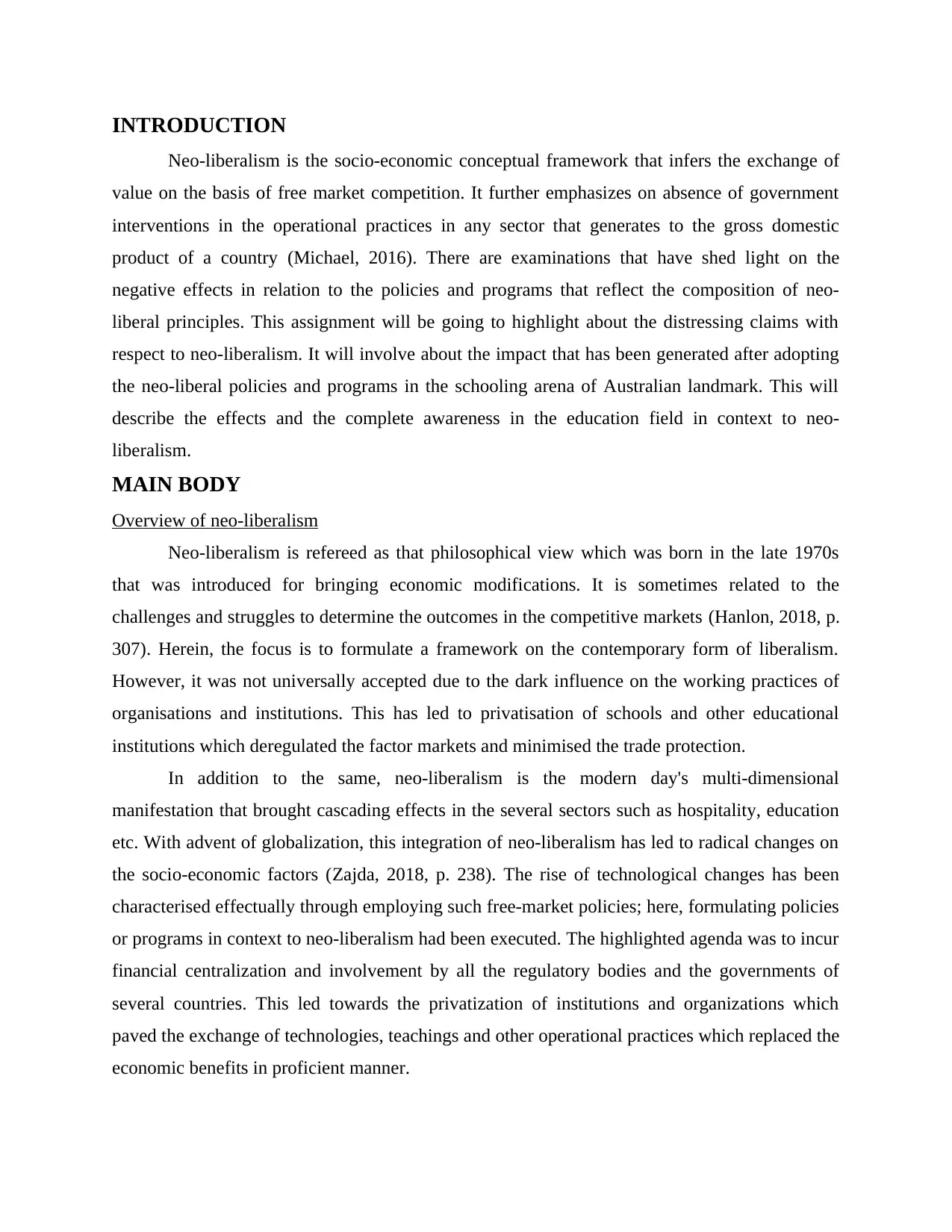
INTRODUCTION
Neo-liberalism is the socio-economic conceptual framework that infers the exchange of
value on the basis of free market competition. It further emphasizes on absence of government
interventions in the operational practices in any sector that generates to the gross domestic
product of a country (Michael, 2016). There are examinations that have shed light on the
negative effects in relation to the policies and programs that reflect the composition of neo-
liberal principles. This assignment will be going to highlight about the distressing claims with
respect to neo-liberalism. It will involve about the impact that has been generated after adopting
the neo-liberal policies and programs in the schooling arena of Australian landmark. This will
describe the effects and the complete awareness in the education field in context to neo-
liberalism.
MAIN BODY
Overview of neo-liberalism
Neo-liberalism is refereed as that philosophical view which was born in the late 1970s
that was introduced for bringing economic modifications. It is sometimes related to the
challenges and struggles to determine the outcomes in the competitive markets (Hanlon, 2018, p.
307). Herein, the focus is to formulate a framework on the contemporary form of liberalism.
However, it was not universally accepted due to the dark influence on the working practices of
organisations and institutions. This has led to privatisation of schools and other educational
institutions which deregulated the factor markets and minimised the trade protection.
In addition to the same, neo-liberalism is the modern day's multi-dimensional
manifestation that brought cascading effects in the several sectors such as hospitality, education
etc. With advent of globalization, this integration of neo-liberalism has led to radical changes on
the socio-economic factors (Zajda, 2018, p. 238). The rise of technological changes has been
characterised effectually through employing such free-market policies; here, formulating policies
or programs in context to neo-liberalism had been executed. The highlighted agenda was to incur
financial centralization and involvement by all the regulatory bodies and the governments of
several countries. This led towards the privatization of institutions and organizations which
paved the exchange of technologies, teachings and other operational practices which replaced the
economic benefits in proficient manner.
Neo-liberalism is the socio-economic conceptual framework that infers the exchange of
value on the basis of free market competition. It further emphasizes on absence of government
interventions in the operational practices in any sector that generates to the gross domestic
product of a country (Michael, 2016). There are examinations that have shed light on the
negative effects in relation to the policies and programs that reflect the composition of neo-
liberal principles. This assignment will be going to highlight about the distressing claims with
respect to neo-liberalism. It will involve about the impact that has been generated after adopting
the neo-liberal policies and programs in the schooling arena of Australian landmark. This will
describe the effects and the complete awareness in the education field in context to neo-
liberalism.
MAIN BODY
Overview of neo-liberalism
Neo-liberalism is refereed as that philosophical view which was born in the late 1970s
that was introduced for bringing economic modifications. It is sometimes related to the
challenges and struggles to determine the outcomes in the competitive markets (Hanlon, 2018, p.
307). Herein, the focus is to formulate a framework on the contemporary form of liberalism.
However, it was not universally accepted due to the dark influence on the working practices of
organisations and institutions. This has led to privatisation of schools and other educational
institutions which deregulated the factor markets and minimised the trade protection.
In addition to the same, neo-liberalism is the modern day's multi-dimensional
manifestation that brought cascading effects in the several sectors such as hospitality, education
etc. With advent of globalization, this integration of neo-liberalism has led to radical changes on
the socio-economic factors (Zajda, 2018, p. 238). The rise of technological changes has been
characterised effectually through employing such free-market policies; here, formulating policies
or programs in context to neo-liberalism had been executed. The highlighted agenda was to incur
financial centralization and involvement by all the regulatory bodies and the governments of
several countries. This led towards the privatization of institutions and organizations which
paved the exchange of technologies, teachings and other operational practices which replaced the
economic benefits in proficient manner.
⊘ This is a preview!⊘
Do you want full access?
Subscribe today to unlock all pages.

Trusted by 1+ million students worldwide
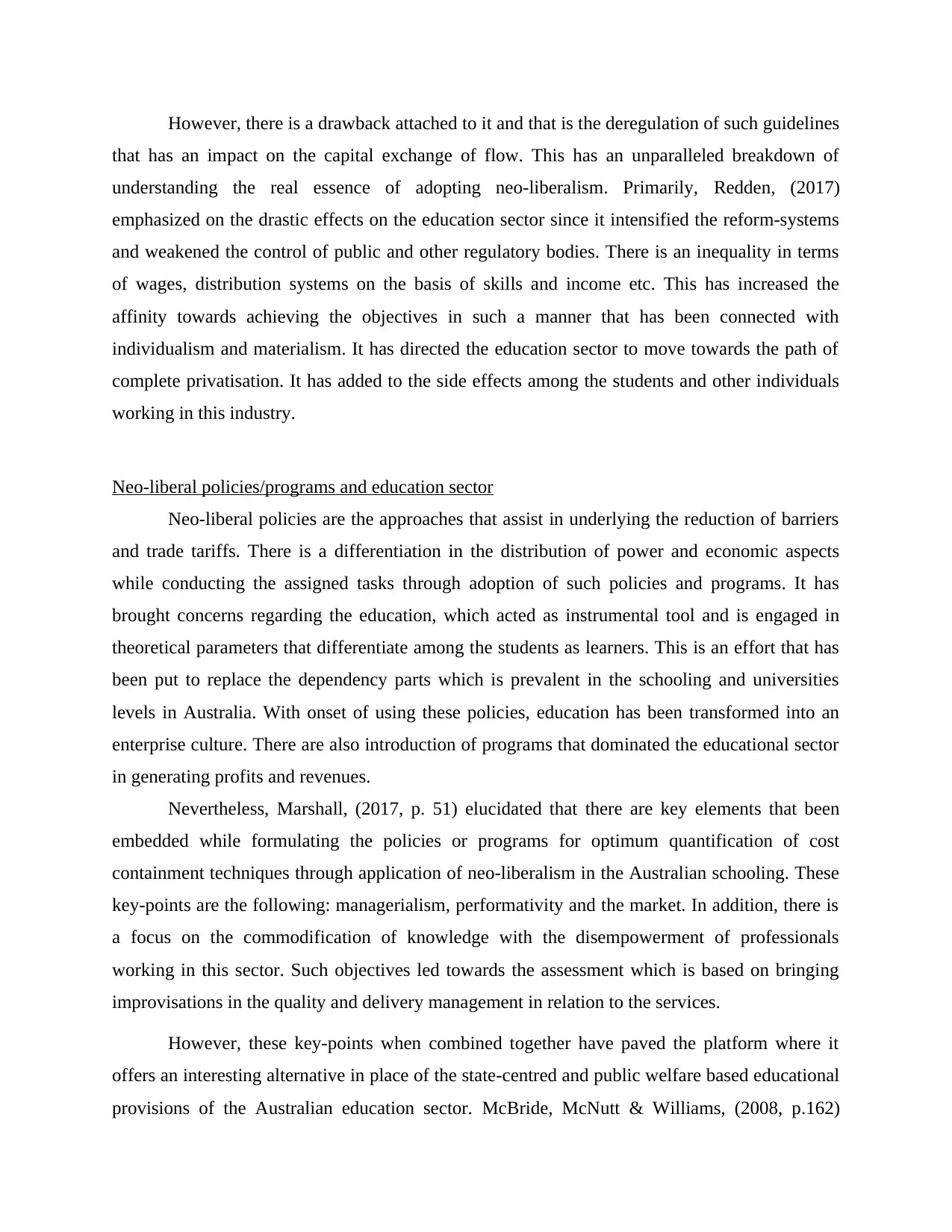
However, there is a drawback attached to it and that is the deregulation of such guidelines
that has an impact on the capital exchange of flow. This has an unparalleled breakdown of
understanding the real essence of adopting neo-liberalism. Primarily, Redden, (2017)
emphasized on the drastic effects on the education sector since it intensified the reform-systems
and weakened the control of public and other regulatory bodies. There is an inequality in terms
of wages, distribution systems on the basis of skills and income etc. This has increased the
affinity towards achieving the objectives in such a manner that has been connected with
individualism and materialism. It has directed the education sector to move towards the path of
complete privatisation. It has added to the side effects among the students and other individuals
working in this industry.
Neo-liberal policies/programs and education sector
Neo-liberal policies are the approaches that assist in underlying the reduction of barriers
and trade tariffs. There is a differentiation in the distribution of power and economic aspects
while conducting the assigned tasks through adoption of such policies and programs. It has
brought concerns regarding the education, which acted as instrumental tool and is engaged in
theoretical parameters that differentiate among the students as learners. This is an effort that has
been put to replace the dependency parts which is prevalent in the schooling and universities
levels in Australia. With onset of using these policies, education has been transformed into an
enterprise culture. There are also introduction of programs that dominated the educational sector
in generating profits and revenues.
Nevertheless, Marshall, (2017, p. 51) elucidated that there are key elements that been
embedded while formulating the policies or programs for optimum quantification of cost
containment techniques through application of neo-liberalism in the Australian schooling. These
key-points are the following: managerialism, performativity and the market. In addition, there is
a focus on the commodification of knowledge with the disempowerment of professionals
working in this sector. Such objectives led towards the assessment which is based on bringing
improvisations in the quality and delivery management in relation to the services.
However, these key-points when combined together have paved the platform where it
offers an interesting alternative in place of the state-centred and public welfare based educational
provisions of the Australian education sector. McBride, McNutt & Williams, (2008, p.162)
that has an impact on the capital exchange of flow. This has an unparalleled breakdown of
understanding the real essence of adopting neo-liberalism. Primarily, Redden, (2017)
emphasized on the drastic effects on the education sector since it intensified the reform-systems
and weakened the control of public and other regulatory bodies. There is an inequality in terms
of wages, distribution systems on the basis of skills and income etc. This has increased the
affinity towards achieving the objectives in such a manner that has been connected with
individualism and materialism. It has directed the education sector to move towards the path of
complete privatisation. It has added to the side effects among the students and other individuals
working in this industry.
Neo-liberal policies/programs and education sector
Neo-liberal policies are the approaches that assist in underlying the reduction of barriers
and trade tariffs. There is a differentiation in the distribution of power and economic aspects
while conducting the assigned tasks through adoption of such policies and programs. It has
brought concerns regarding the education, which acted as instrumental tool and is engaged in
theoretical parameters that differentiate among the students as learners. This is an effort that has
been put to replace the dependency parts which is prevalent in the schooling and universities
levels in Australia. With onset of using these policies, education has been transformed into an
enterprise culture. There are also introduction of programs that dominated the educational sector
in generating profits and revenues.
Nevertheless, Marshall, (2017, p. 51) elucidated that there are key elements that been
embedded while formulating the policies or programs for optimum quantification of cost
containment techniques through application of neo-liberalism in the Australian schooling. These
key-points are the following: managerialism, performativity and the market. In addition, there is
a focus on the commodification of knowledge with the disempowerment of professionals
working in this sector. Such objectives led towards the assessment which is based on bringing
improvisations in the quality and delivery management in relation to the services.
However, these key-points when combined together have paved the platform where it
offers an interesting alternative in place of the state-centred and public welfare based educational
provisions of the Australian education sector. McBride, McNutt & Williams, (2008, p.162)
Paraphrase This Document
Need a fresh take? Get an instant paraphrase of this document with our AI Paraphraser
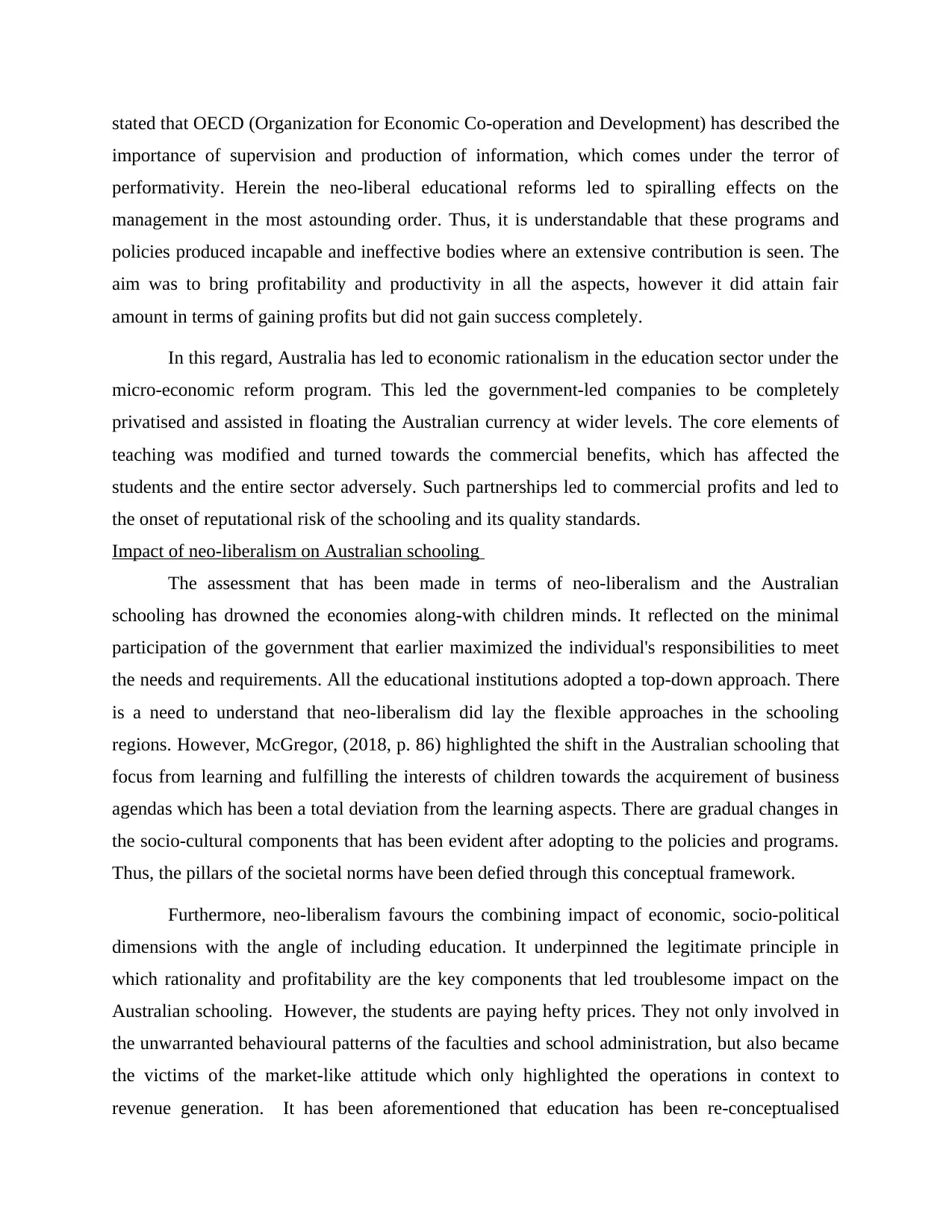
stated that OECD (Organization for Economic Co-operation and Development) has described the
importance of supervision and production of information, which comes under the terror of
performativity. Herein the neo-liberal educational reforms led to spiralling effects on the
management in the most astounding order. Thus, it is understandable that these programs and
policies produced incapable and ineffective bodies where an extensive contribution is seen. The
aim was to bring profitability and productivity in all the aspects, however it did attain fair
amount in terms of gaining profits but did not gain success completely.
In this regard, Australia has led to economic rationalism in the education sector under the
micro-economic reform program. This led the government-led companies to be completely
privatised and assisted in floating the Australian currency at wider levels. The core elements of
teaching was modified and turned towards the commercial benefits, which has affected the
students and the entire sector adversely. Such partnerships led to commercial profits and led to
the onset of reputational risk of the schooling and its quality standards.
Impact of neo-liberalism on Australian schooling
The assessment that has been made in terms of neo-liberalism and the Australian
schooling has drowned the economies along-with children minds. It reflected on the minimal
participation of the government that earlier maximized the individual's responsibilities to meet
the needs and requirements. All the educational institutions adopted a top-down approach. There
is a need to understand that neo-liberalism did lay the flexible approaches in the schooling
regions. However, McGregor, (2018, p. 86) highlighted the shift in the Australian schooling that
focus from learning and fulfilling the interests of children towards the acquirement of business
agendas which has been a total deviation from the learning aspects. There are gradual changes in
the socio-cultural components that has been evident after adopting to the policies and programs.
Thus, the pillars of the societal norms have been defied through this conceptual framework.
Furthermore, neo-liberalism favours the combining impact of economic, socio-political
dimensions with the angle of including education. It underpinned the legitimate principle in
which rationality and profitability are the key components that led troublesome impact on the
Australian schooling. However, the students are paying hefty prices. They not only involved in
the unwarranted behavioural patterns of the faculties and school administration, but also became
the victims of the market-like attitude which only highlighted the operations in context to
revenue generation. It has been aforementioned that education has been re-conceptualised
importance of supervision and production of information, which comes under the terror of
performativity. Herein the neo-liberal educational reforms led to spiralling effects on the
management in the most astounding order. Thus, it is understandable that these programs and
policies produced incapable and ineffective bodies where an extensive contribution is seen. The
aim was to bring profitability and productivity in all the aspects, however it did attain fair
amount in terms of gaining profits but did not gain success completely.
In this regard, Australia has led to economic rationalism in the education sector under the
micro-economic reform program. This led the government-led companies to be completely
privatised and assisted in floating the Australian currency at wider levels. The core elements of
teaching was modified and turned towards the commercial benefits, which has affected the
students and the entire sector adversely. Such partnerships led to commercial profits and led to
the onset of reputational risk of the schooling and its quality standards.
Impact of neo-liberalism on Australian schooling
The assessment that has been made in terms of neo-liberalism and the Australian
schooling has drowned the economies along-with children minds. It reflected on the minimal
participation of the government that earlier maximized the individual's responsibilities to meet
the needs and requirements. All the educational institutions adopted a top-down approach. There
is a need to understand that neo-liberalism did lay the flexible approaches in the schooling
regions. However, McGregor, (2018, p. 86) highlighted the shift in the Australian schooling that
focus from learning and fulfilling the interests of children towards the acquirement of business
agendas which has been a total deviation from the learning aspects. There are gradual changes in
the socio-cultural components that has been evident after adopting to the policies and programs.
Thus, the pillars of the societal norms have been defied through this conceptual framework.
Furthermore, neo-liberalism favours the combining impact of economic, socio-political
dimensions with the angle of including education. It underpinned the legitimate principle in
which rationality and profitability are the key components that led troublesome impact on the
Australian schooling. However, the students are paying hefty prices. They not only involved in
the unwarranted behavioural patterns of the faculties and school administration, but also became
the victims of the market-like attitude which only highlighted the operations in context to
revenue generation. It has been aforementioned that education has been re-conceptualised
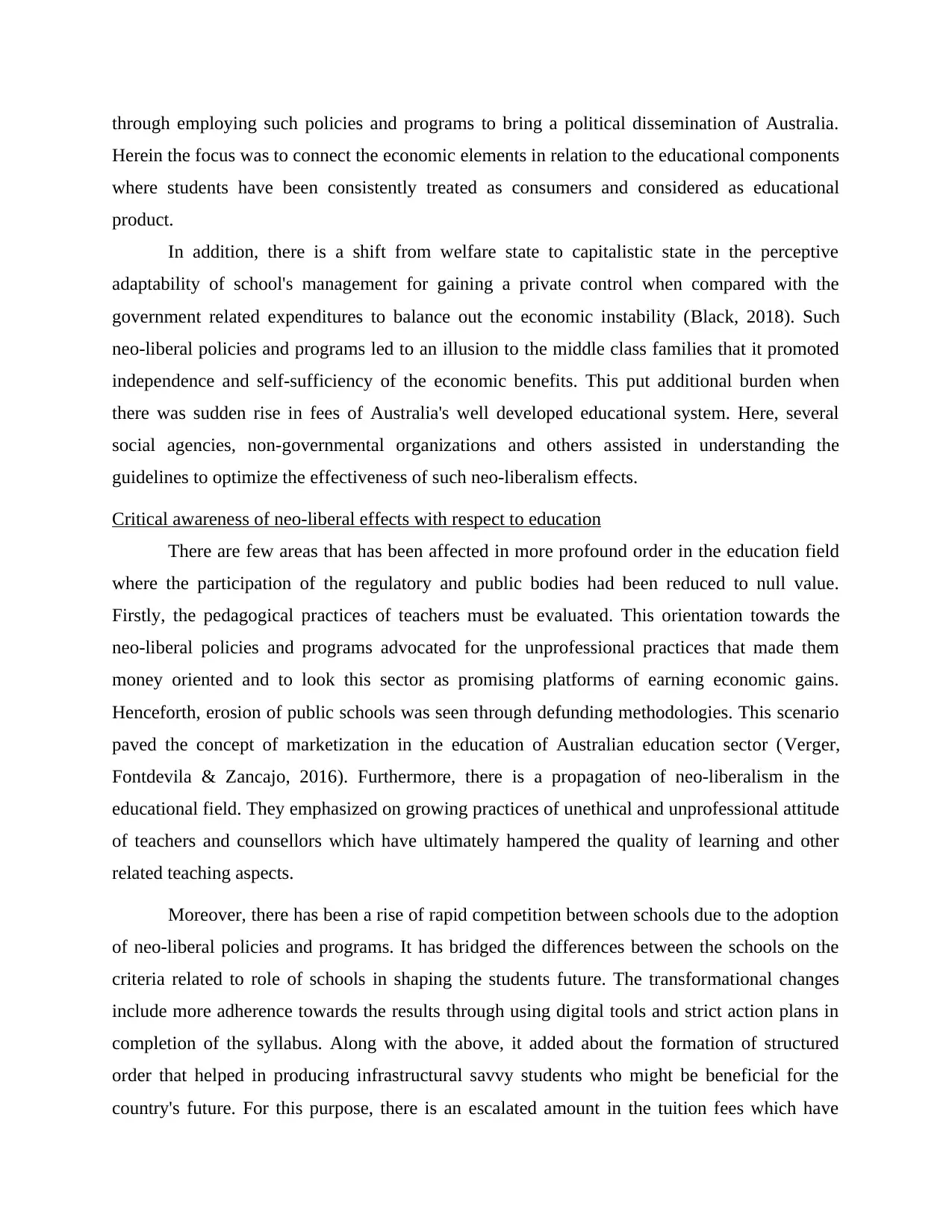
through employing such policies and programs to bring a political dissemination of Australia.
Herein the focus was to connect the economic elements in relation to the educational components
where students have been consistently treated as consumers and considered as educational
product.
In addition, there is a shift from welfare state to capitalistic state in the perceptive
adaptability of school's management for gaining a private control when compared with the
government related expenditures to balance out the economic instability (Black, 2018). Such
neo-liberal policies and programs led to an illusion to the middle class families that it promoted
independence and self-sufficiency of the economic benefits. This put additional burden when
there was sudden rise in fees of Australia's well developed educational system. Here, several
social agencies, non-governmental organizations and others assisted in understanding the
guidelines to optimize the effectiveness of such neo-liberalism effects.
Critical awareness of neo-liberal effects with respect to education
There are few areas that has been affected in more profound order in the education field
where the participation of the regulatory and public bodies had been reduced to null value.
Firstly, the pedagogical practices of teachers must be evaluated. This orientation towards the
neo-liberal policies and programs advocated for the unprofessional practices that made them
money oriented and to look this sector as promising platforms of earning economic gains.
Henceforth, erosion of public schools was seen through defunding methodologies. This scenario
paved the concept of marketization in the education of Australian education sector (Verger,
Fontdevila & Zancajo, 2016). Furthermore, there is a propagation of neo-liberalism in the
educational field. They emphasized on growing practices of unethical and unprofessional attitude
of teachers and counsellors which have ultimately hampered the quality of learning and other
related teaching aspects.
Moreover, there has been a rise of rapid competition between schools due to the adoption
of neo-liberal policies and programs. It has bridged the differences between the schools on the
criteria related to role of schools in shaping the students future. The transformational changes
include more adherence towards the results through using digital tools and strict action plans in
completion of the syllabus. Along with the above, it added about the formation of structured
order that helped in producing infrastructural savvy students who might be beneficial for the
country's future. For this purpose, there is an escalated amount in the tuition fees which have
Herein the focus was to connect the economic elements in relation to the educational components
where students have been consistently treated as consumers and considered as educational
product.
In addition, there is a shift from welfare state to capitalistic state in the perceptive
adaptability of school's management for gaining a private control when compared with the
government related expenditures to balance out the economic instability (Black, 2018). Such
neo-liberal policies and programs led to an illusion to the middle class families that it promoted
independence and self-sufficiency of the economic benefits. This put additional burden when
there was sudden rise in fees of Australia's well developed educational system. Here, several
social agencies, non-governmental organizations and others assisted in understanding the
guidelines to optimize the effectiveness of such neo-liberalism effects.
Critical awareness of neo-liberal effects with respect to education
There are few areas that has been affected in more profound order in the education field
where the participation of the regulatory and public bodies had been reduced to null value.
Firstly, the pedagogical practices of teachers must be evaluated. This orientation towards the
neo-liberal policies and programs advocated for the unprofessional practices that made them
money oriented and to look this sector as promising platforms of earning economic gains.
Henceforth, erosion of public schools was seen through defunding methodologies. This scenario
paved the concept of marketization in the education of Australian education sector (Verger,
Fontdevila & Zancajo, 2016). Furthermore, there is a propagation of neo-liberalism in the
educational field. They emphasized on growing practices of unethical and unprofessional attitude
of teachers and counsellors which have ultimately hampered the quality of learning and other
related teaching aspects.
Moreover, there has been a rise of rapid competition between schools due to the adoption
of neo-liberal policies and programs. It has bridged the differences between the schools on the
criteria related to role of schools in shaping the students future. The transformational changes
include more adherence towards the results through using digital tools and strict action plans in
completion of the syllabus. Along with the above, it added about the formation of structured
order that helped in producing infrastructural savvy students who might be beneficial for the
country's future. For this purpose, there is an escalated amount in the tuition fees which have
⊘ This is a preview!⊘
Do you want full access?
Subscribe today to unlock all pages.

Trusted by 1+ million students worldwide
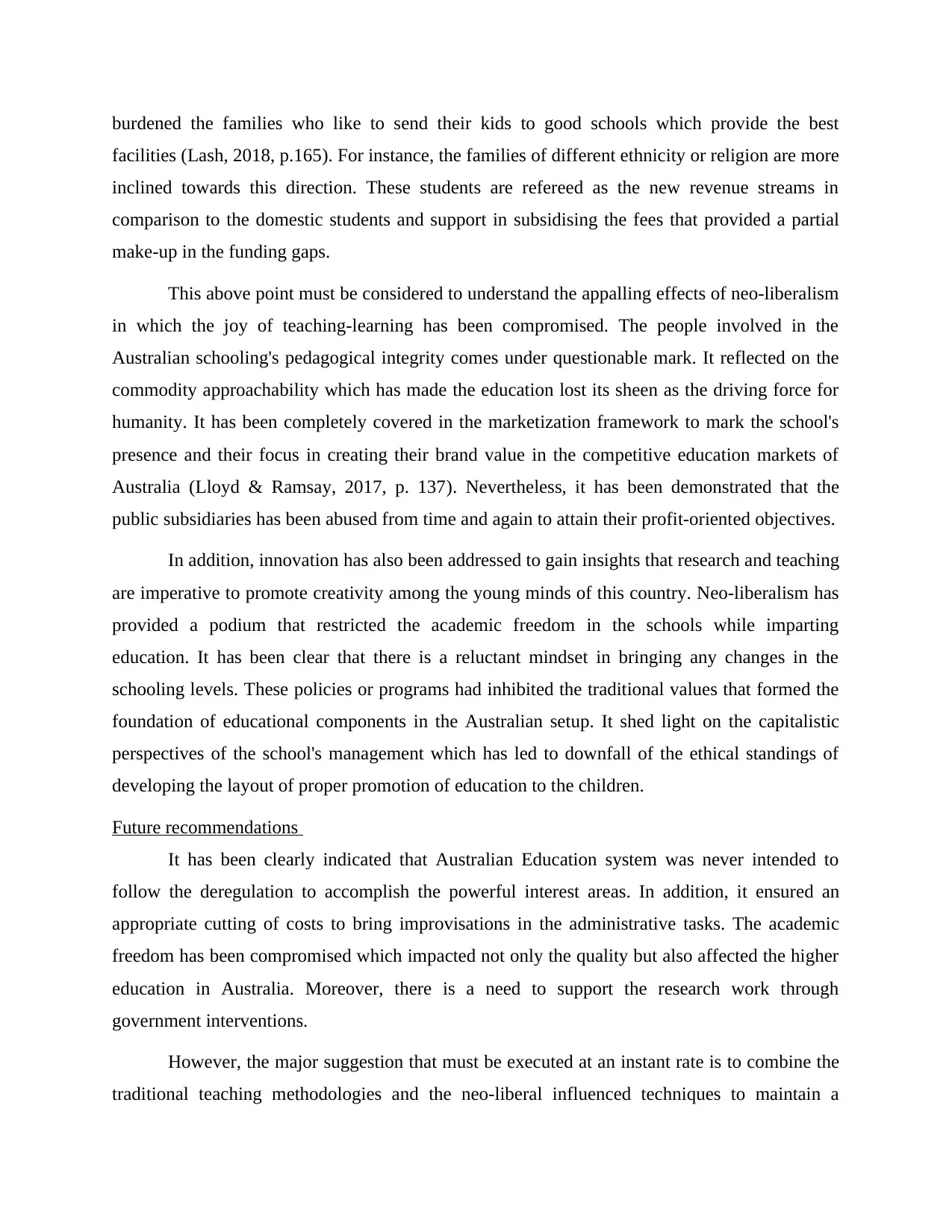
burdened the families who like to send their kids to good schools which provide the best
facilities (Lash, 2018, p.165). For instance, the families of different ethnicity or religion are more
inclined towards this direction. These students are refereed as the new revenue streams in
comparison to the domestic students and support in subsidising the fees that provided a partial
make-up in the funding gaps.
This above point must be considered to understand the appalling effects of neo-liberalism
in which the joy of teaching-learning has been compromised. The people involved in the
Australian schooling's pedagogical integrity comes under questionable mark. It reflected on the
commodity approachability which has made the education lost its sheen as the driving force for
humanity. It has been completely covered in the marketization framework to mark the school's
presence and their focus in creating their brand value in the competitive education markets of
Australia (Lloyd & Ramsay, 2017, p. 137). Nevertheless, it has been demonstrated that the
public subsidiaries has been abused from time and again to attain their profit-oriented objectives.
In addition, innovation has also been addressed to gain insights that research and teaching
are imperative to promote creativity among the young minds of this country. Neo-liberalism has
provided a podium that restricted the academic freedom in the schools while imparting
education. It has been clear that there is a reluctant mindset in bringing any changes in the
schooling levels. These policies or programs had inhibited the traditional values that formed the
foundation of educational components in the Australian setup. It shed light on the capitalistic
perspectives of the school's management which has led to downfall of the ethical standings of
developing the layout of proper promotion of education to the children.
Future recommendations
It has been clearly indicated that Australian Education system was never intended to
follow the deregulation to accomplish the powerful interest areas. In addition, it ensured an
appropriate cutting of costs to bring improvisations in the administrative tasks. The academic
freedom has been compromised which impacted not only the quality but also affected the higher
education in Australia. Moreover, there is a need to support the research work through
government interventions.
However, the major suggestion that must be executed at an instant rate is to combine the
traditional teaching methodologies and the neo-liberal influenced techniques to maintain a
facilities (Lash, 2018, p.165). For instance, the families of different ethnicity or religion are more
inclined towards this direction. These students are refereed as the new revenue streams in
comparison to the domestic students and support in subsidising the fees that provided a partial
make-up in the funding gaps.
This above point must be considered to understand the appalling effects of neo-liberalism
in which the joy of teaching-learning has been compromised. The people involved in the
Australian schooling's pedagogical integrity comes under questionable mark. It reflected on the
commodity approachability which has made the education lost its sheen as the driving force for
humanity. It has been completely covered in the marketization framework to mark the school's
presence and their focus in creating their brand value in the competitive education markets of
Australia (Lloyd & Ramsay, 2017, p. 137). Nevertheless, it has been demonstrated that the
public subsidiaries has been abused from time and again to attain their profit-oriented objectives.
In addition, innovation has also been addressed to gain insights that research and teaching
are imperative to promote creativity among the young minds of this country. Neo-liberalism has
provided a podium that restricted the academic freedom in the schools while imparting
education. It has been clear that there is a reluctant mindset in bringing any changes in the
schooling levels. These policies or programs had inhibited the traditional values that formed the
foundation of educational components in the Australian setup. It shed light on the capitalistic
perspectives of the school's management which has led to downfall of the ethical standings of
developing the layout of proper promotion of education to the children.
Future recommendations
It has been clearly indicated that Australian Education system was never intended to
follow the deregulation to accomplish the powerful interest areas. In addition, it ensured an
appropriate cutting of costs to bring improvisations in the administrative tasks. The academic
freedom has been compromised which impacted not only the quality but also affected the higher
education in Australia. Moreover, there is a need to support the research work through
government interventions.
However, the major suggestion that must be executed at an instant rate is to combine the
traditional teaching methodologies and the neo-liberal influenced techniques to maintain a
Paraphrase This Document
Need a fresh take? Get an instant paraphrase of this document with our AI Paraphraser
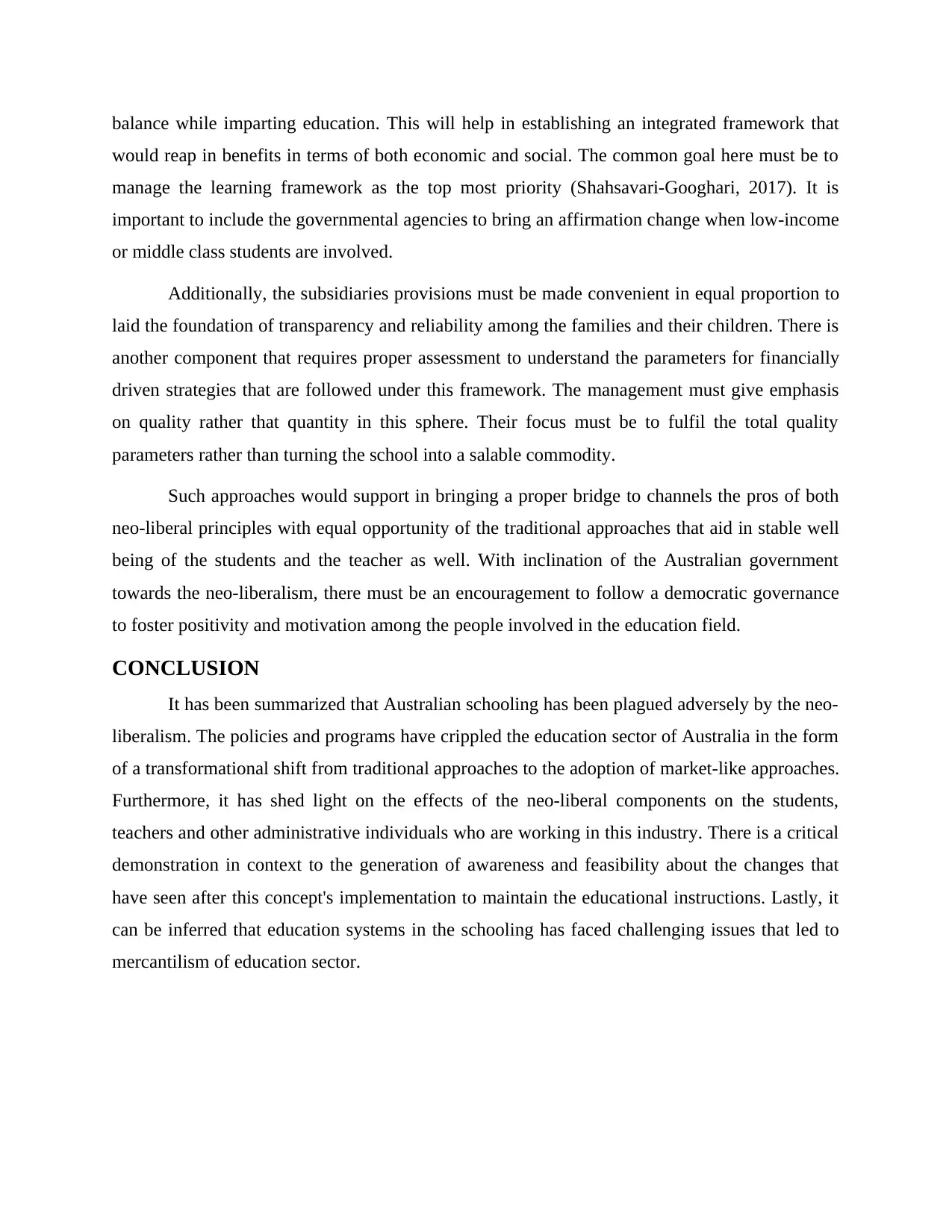
balance while imparting education. This will help in establishing an integrated framework that
would reap in benefits in terms of both economic and social. The common goal here must be to
manage the learning framework as the top most priority (Shahsavari-Googhari, 2017). It is
important to include the governmental agencies to bring an affirmation change when low-income
or middle class students are involved.
Additionally, the subsidiaries provisions must be made convenient in equal proportion to
laid the foundation of transparency and reliability among the families and their children. There is
another component that requires proper assessment to understand the parameters for financially
driven strategies that are followed under this framework. The management must give emphasis
on quality rather that quantity in this sphere. Their focus must be to fulfil the total quality
parameters rather than turning the school into a salable commodity.
Such approaches would support in bringing a proper bridge to channels the pros of both
neo-liberal principles with equal opportunity of the traditional approaches that aid in stable well
being of the students and the teacher as well. With inclination of the Australian government
towards the neo-liberalism, there must be an encouragement to follow a democratic governance
to foster positivity and motivation among the people involved in the education field.
CONCLUSION
It has been summarized that Australian schooling has been plagued adversely by the neo-
liberalism. The policies and programs have crippled the education sector of Australia in the form
of a transformational shift from traditional approaches to the adoption of market-like approaches.
Furthermore, it has shed light on the effects of the neo-liberal components on the students,
teachers and other administrative individuals who are working in this industry. There is a critical
demonstration in context to the generation of awareness and feasibility about the changes that
have seen after this concept's implementation to maintain the educational instructions. Lastly, it
can be inferred that education systems in the schooling has faced challenging issues that led to
mercantilism of education sector.
would reap in benefits in terms of both economic and social. The common goal here must be to
manage the learning framework as the top most priority (Shahsavari-Googhari, 2017). It is
important to include the governmental agencies to bring an affirmation change when low-income
or middle class students are involved.
Additionally, the subsidiaries provisions must be made convenient in equal proportion to
laid the foundation of transparency and reliability among the families and their children. There is
another component that requires proper assessment to understand the parameters for financially
driven strategies that are followed under this framework. The management must give emphasis
on quality rather that quantity in this sphere. Their focus must be to fulfil the total quality
parameters rather than turning the school into a salable commodity.
Such approaches would support in bringing a proper bridge to channels the pros of both
neo-liberal principles with equal opportunity of the traditional approaches that aid in stable well
being of the students and the teacher as well. With inclination of the Australian government
towards the neo-liberalism, there must be an encouragement to follow a democratic governance
to foster positivity and motivation among the people involved in the education field.
CONCLUSION
It has been summarized that Australian schooling has been plagued adversely by the neo-
liberalism. The policies and programs have crippled the education sector of Australia in the form
of a transformational shift from traditional approaches to the adoption of market-like approaches.
Furthermore, it has shed light on the effects of the neo-liberal components on the students,
teachers and other administrative individuals who are working in this industry. There is a critical
demonstration in context to the generation of awareness and feasibility about the changes that
have seen after this concept's implementation to maintain the educational instructions. Lastly, it
can be inferred that education systems in the schooling has faced challenging issues that led to
mercantilism of education sector.
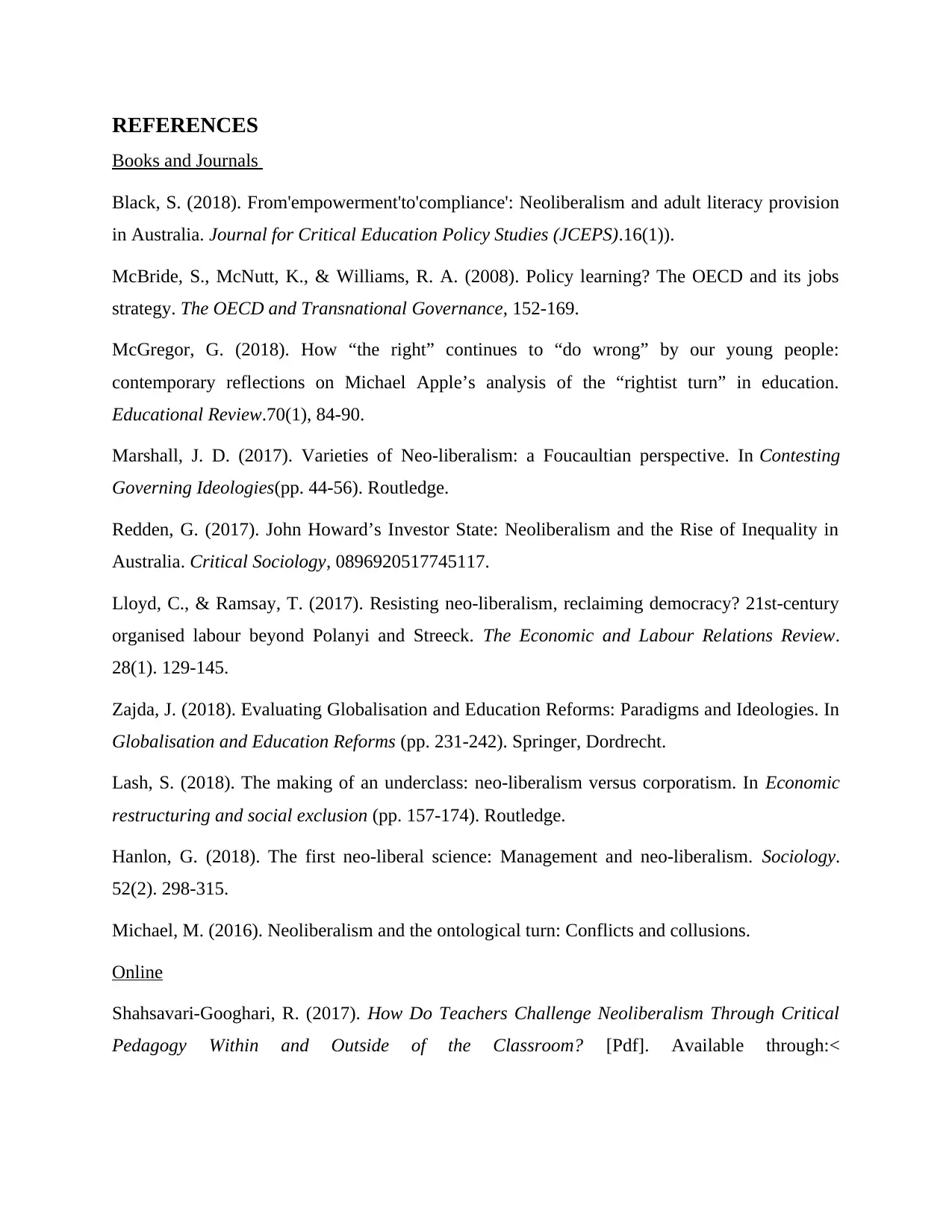
REFERENCES
Books and Journals
Black, S. (2018). From'empowerment'to'compliance': Neoliberalism and adult literacy provision
in Australia. Journal for Critical Education Policy Studies (JCEPS).16(1)).
McBride, S., McNutt, K., & Williams, R. A. (2008). Policy learning? The OECD and its jobs
strategy. The OECD and Transnational Governance, 152-169.
McGregor, G. (2018). How “the right” continues to “do wrong” by our young people:
contemporary reflections on Michael Apple’s analysis of the “rightist turn” in education.
Educational Review.70(1), 84-90.
Marshall, J. D. (2017). Varieties of Neo-liberalism: a Foucaultian perspective. In Contesting
Governing Ideologies(pp. 44-56). Routledge.
Redden, G. (2017). John Howard’s Investor State: Neoliberalism and the Rise of Inequality in
Australia. Critical Sociology, 0896920517745117.
Lloyd, C., & Ramsay, T. (2017). Resisting neo-liberalism, reclaiming democracy? 21st-century
organised labour beyond Polanyi and Streeck. The Economic and Labour Relations Review.
28(1). 129-145.
Zajda, J. (2018). Evaluating Globalisation and Education Reforms: Paradigms and Ideologies. In
Globalisation and Education Reforms (pp. 231-242). Springer, Dordrecht.
Lash, S. (2018). The making of an underclass: neo-liberalism versus corporatism. In Economic
restructuring and social exclusion (pp. 157-174). Routledge.
Hanlon, G. (2018). The first neo-liberal science: Management and neo-liberalism. Sociology.
52(2). 298-315.
Michael, M. (2016). Neoliberalism and the ontological turn: Conflicts and collusions.
Online
Shahsavari-Googhari, R. (2017). How Do Teachers Challenge Neoliberalism Through Critical
Pedagogy Within and Outside of the Classroom? [Pdf]. Available through:<
Books and Journals
Black, S. (2018). From'empowerment'to'compliance': Neoliberalism and adult literacy provision
in Australia. Journal for Critical Education Policy Studies (JCEPS).16(1)).
McBride, S., McNutt, K., & Williams, R. A. (2008). Policy learning? The OECD and its jobs
strategy. The OECD and Transnational Governance, 152-169.
McGregor, G. (2018). How “the right” continues to “do wrong” by our young people:
contemporary reflections on Michael Apple’s analysis of the “rightist turn” in education.
Educational Review.70(1), 84-90.
Marshall, J. D. (2017). Varieties of Neo-liberalism: a Foucaultian perspective. In Contesting
Governing Ideologies(pp. 44-56). Routledge.
Redden, G. (2017). John Howard’s Investor State: Neoliberalism and the Rise of Inequality in
Australia. Critical Sociology, 0896920517745117.
Lloyd, C., & Ramsay, T. (2017). Resisting neo-liberalism, reclaiming democracy? 21st-century
organised labour beyond Polanyi and Streeck. The Economic and Labour Relations Review.
28(1). 129-145.
Zajda, J. (2018). Evaluating Globalisation and Education Reforms: Paradigms and Ideologies. In
Globalisation and Education Reforms (pp. 231-242). Springer, Dordrecht.
Lash, S. (2018). The making of an underclass: neo-liberalism versus corporatism. In Economic
restructuring and social exclusion (pp. 157-174). Routledge.
Hanlon, G. (2018). The first neo-liberal science: Management and neo-liberalism. Sociology.
52(2). 298-315.
Michael, M. (2016). Neoliberalism and the ontological turn: Conflicts and collusions.
Online
Shahsavari-Googhari, R. (2017). How Do Teachers Challenge Neoliberalism Through Critical
Pedagogy Within and Outside of the Classroom? [Pdf]. Available through:<
⊘ This is a preview!⊘
Do you want full access?
Subscribe today to unlock all pages.

Trusted by 1+ million students worldwide
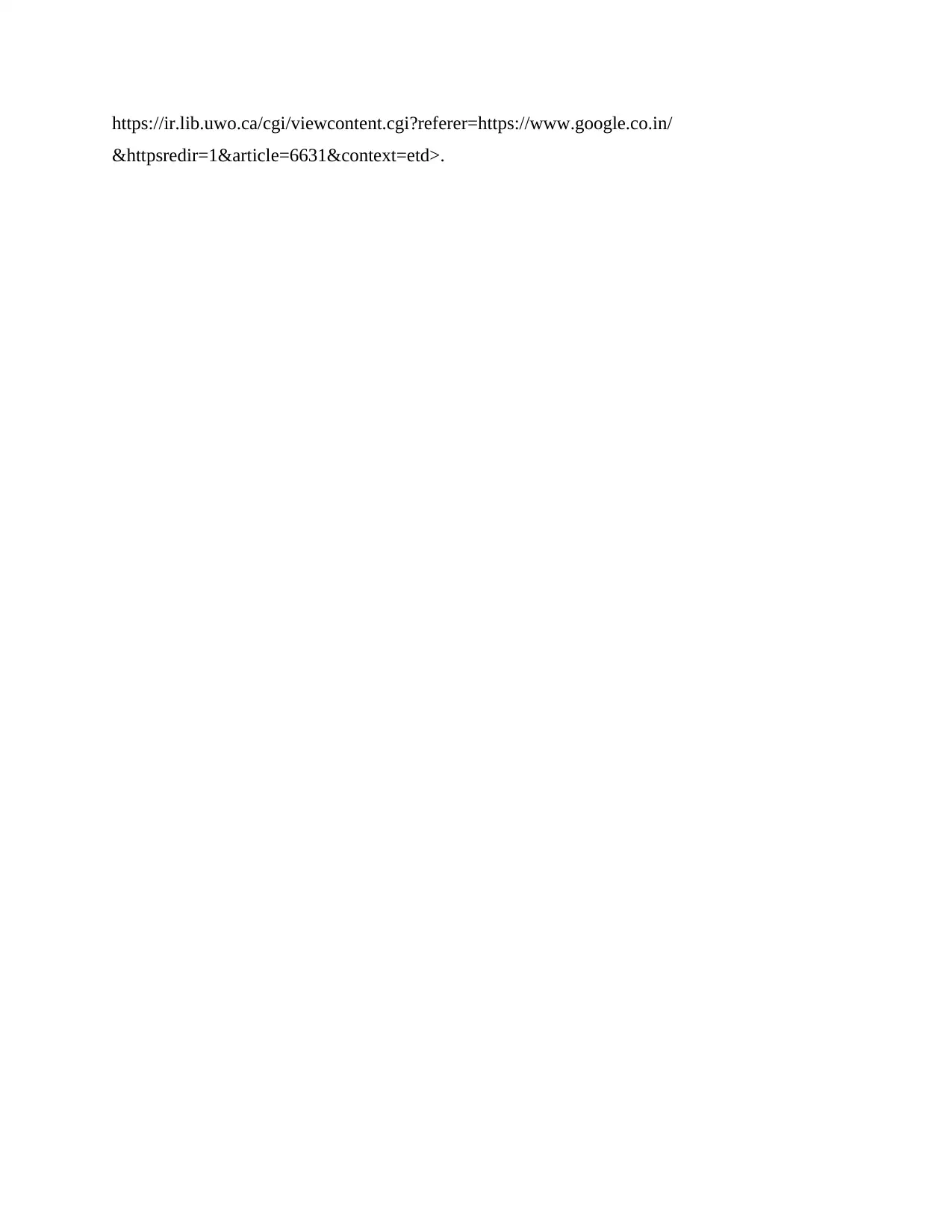
https://ir.lib.uwo.ca/cgi/viewcontent.cgi?referer=https://www.google.co.in/
&httpsredir=1&article=6631&context=etd>.
&httpsredir=1&article=6631&context=etd>.
1 out of 10
Related Documents
Your All-in-One AI-Powered Toolkit for Academic Success.
+13062052269
info@desklib.com
Available 24*7 on WhatsApp / Email
![[object Object]](/_next/static/media/star-bottom.7253800d.svg)
Unlock your academic potential
Copyright © 2020–2026 A2Z Services. All Rights Reserved. Developed and managed by ZUCOL.





